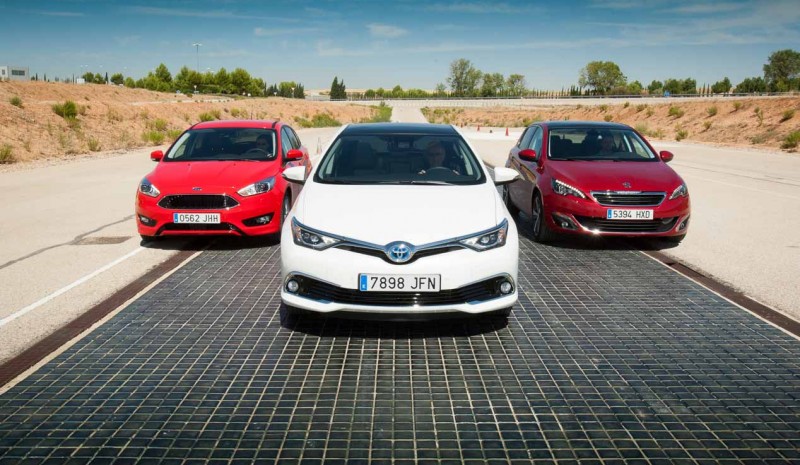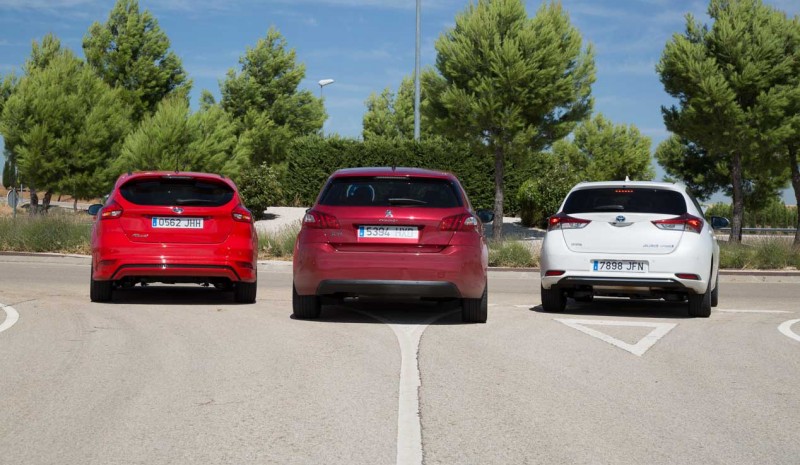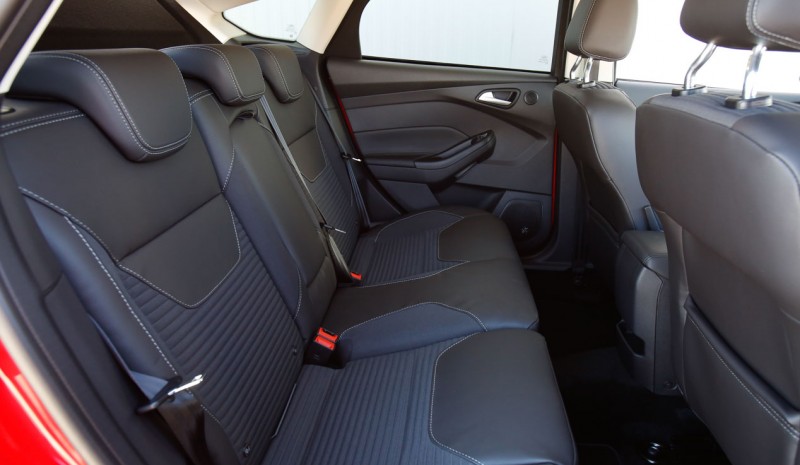Ford Focus 1.5 TDCI, Peugeot 308 and Toyota Auris Hybrid PureTech, what fuel interest?
The car improved efficiency gasoline and diesel prices are down. It will hybrid that average? Here’s a duel between three Peugeot, Ford and Toyota.
A Toyota Auris Hybrid as representative of the hybrid technology, a Peugeot 308 1.2 PureTech as a champion of new trends in gasoline, and a Ford Focus 1.5 TDCi Diesel good example. Three cars with high weight in sales in the category with the best relationship between value, product and technology throughout the market. The three, with a heavy load in active and passive safety with a behavior and roll differentiated only by nuances, with the possibility of very similar equipment, similar interior capacity and even price of such acquisition equal equipment. So, leaving aside brand preferences, today I not think there’s a differentiator factor the engine between cars competing on equal terms in the same category. And as you see, we have here gone the three ends.
Three different paths that aim identical meeting point: performance, reliability, touch, mechanical pleasure, performance and as, Real Cost of Ownership. Diesel is still going strong even in the distribution of sales by fuel type has already been a turning point. Not that gasoline reemerge from the ashes, but technically seems to have been able to move more and better than diesel. The motor 1.2 PureTech PSA riding in this case Peugeot 308 It’s one of the best representatives this natural evolution carried out by miniaturized motors continent but with maximum technical content, able to demonstrate that less, sometimes, it can be more. And if talking about hybrid involves, almost reflexively think of Toyota, it is curious to see their hopes for sales growth in our market segments in which they themselves have put their own roadblocks: Today the Auris, for example, you have already to his credit one of those gasoline engines last generation, the 120T -with an exceptional staging and performance, by the way, and a great price of purchasers; and the mere fact of resorting to BMW as a supplier of diesel engines think it is, by itself, a temptation for the client. Play, yes, with the definition of range for example, only Toyota RAV 4 Hybrid have traction totally newly updated, and of course, with the benefits and actual performance of own hybrid technology for that alone, it a winning technology.
The concept remains the same, but how it has changed the Toyota Auris Hybrid. The extensible something gamma- car the whole is infinitely more comfortable, more accurate and has better feel of driving. On the mechanical side it has now more and better role the electric motor and automatic transmission has a more natural management, but without result everything nice you expect from an automatic change-not forget to analyze the purchase price of the product in relation to its rivals. Its natural setting is the city, and not only for its unbeatable fuel economy, also for smooth running and mechanical quality. The Auris Hybrid Toyota provides ongoing refinement such that both the unctuous 1.5 TDCi Using Ford Focus as elastic and agile hyper 1.2 PureTech the Peugeot 308-or as the very Auris 120T and 115d of his own gamma- earlier times seem thrusters. I remind you that your strategy is not their autonomy in electric mode at low speed, but the sum of many small tours with the gasoline engine mode "latent". So for urban travel, the Toyota Auris Hybrid devastates the other engines in the range, his two rivals or even urban models with less power, weight and size, and I think it also made clear the driver of cities as Madrid.
But playing explore new scenarios, the usual our travels. Means road and go meet a very fast Peugeot 308 that none of the other two cars could go, and where those nuances chassis I also commented that before mark and some other difference: more direct, reactive, firmer suspension, more fun, although it has nothing to envy the Ford Focus. What has stuck this great little three-cylinder engine but until someone else can prove -the VW 1.0 TSi has all papeletas-, all these new small thrusters surprised by how much walk in relation to their displacement that so little -the mínimo- spendable. And also they remain highly variable consumption engines in relation to speed. Yes, yes, that "background" Diesel physicist, with great autonomy to the German rates.
By the way, he said Toyota what their hybrids are as efficient as a diesel up "our" legal speeds, but that should be in its infancy. I now come to be even when, by its almost "infinite" development, force your opponent turbodiesel to turn away from their optimum power and torque areas, because today turbodiesel engine Diesel concentrates its performance in its first 2,000 laps. And transitional arrangements and rhythm changes, assistance "modest" Toyota 1.8 comes without blowing air and the corresponding amount of fuel inside the chamber, avoiding those high instantaneous consumption peaks of the "turbogasolina". Yes, the hybrid looks better steadily that variable because in fact, the effect of the electric motor Auris has great punching power, though … how far it has worked supercharged engines to precisely do not seem ! The new 1.5 TDCi is a good example: It is more elastic and progressive than the previous 1.6 TDCi / 115 and equals or improves all performance data, except consumption in road … Truthfully, Euro VI do not think bringing us back to lows already reached -in fact, we have been experiencing a regression-though I do not think that the gasoline engine "to dry" You can become so, so efficient. But if it is find that under average, this Toyota hybrid technology, today mounted a very homogeneous Toyota Auris, It seems to be at its best.
In a nutshell:
Acceleration. How much and how. The type of automatic transmission using Auris filter and slows its acceleration capability. 1.2 THP has everything in its favor to clearly dominate this test.
Frenada. Touch qualify. No, the best figure does not match with the best braking note: touch too "hybrid" Auris pedal still requires more sensitive than the rest.
Sonority. Electric ride. Many small sections in electric mode adds the Auris Hybrid in the city, hence its best values. On the road, annoying wind noise for all three.
overtaking. Everybody "Turbo". Ovbiamente, I mean in the case of Auris to the contribution of its electric motor. Very good data for it, but whoever comes out really is the engine 1.2 Pure Tech, always with the best punch.
Power and torque curves. constant force. Welcome the arrival of the 1.5 TDCi, more elastic than the outgoing 1.6 TDCi engine. But the 1.2 Pure Tech propeller with the best performance curves: power always upward curve and constant torque from very low revs, which, yes, is more appreciated its mechanical architecture.
consumptions. Good representatives. The Auris Hybrid clearly dominates the city, the 1.2 Pure Tech achieves excellent records for power and performance and Focus TDCi is the one most "background".
Dimensions and weights. Centimeters and real space. Toyota is leading not only amplitude levels, also by characteristics of the enclosure, and its almost flat floor. 308 to assert its lightweight structure and engine.
You may also like:
Cars spend less
New generation Toyota Prius hybrid athlete
Renault Megane, the last to arrive




